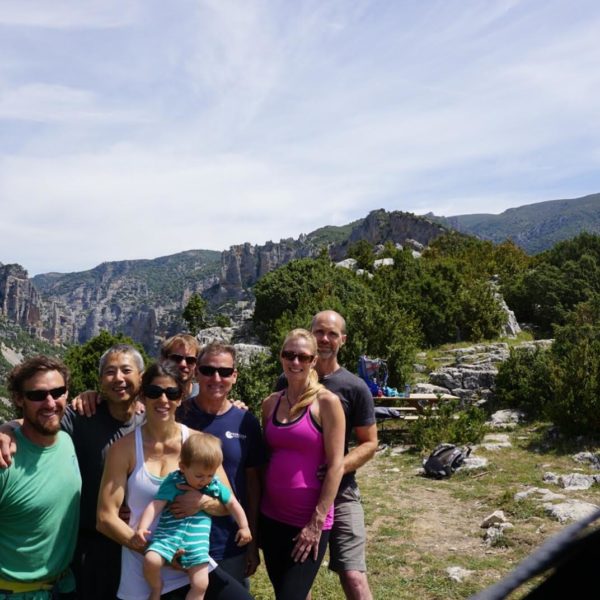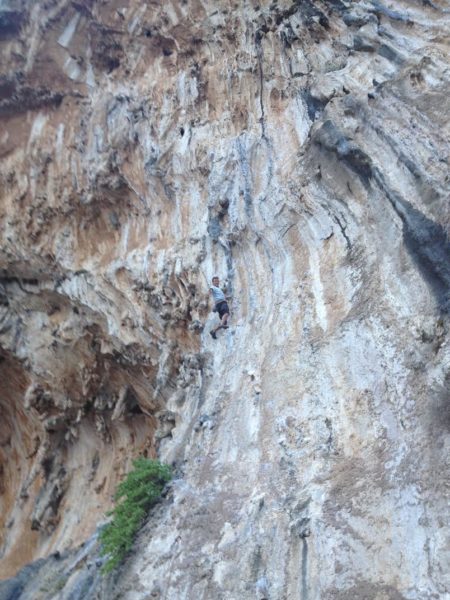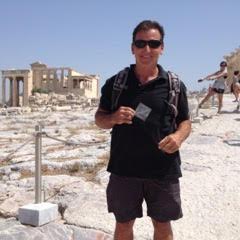Perhaps while watching the Olympic games in Rio, it dawned on you that those incredible gymnasts could be pretty decent climbers… Or maybe your own background in gymnastics has made YOU a better climber! We sat down with Sacramento Pipeworks member and UC Davis coach Ron Manara to learn about the parallels between climbing and gymnastics. In this edition, Ron shares his expertise on everything from body mechanics in competition to healthful living and travel.
How many years have you been climbing, and what have you observed as the biggest change over time?
I have been climbing sporadically for about 30 years due to my duties of recruiting, training, and traveling as a university and private club coach for women’s gymnastics. It’s only been within the last 12 years that I have been able to train consistently, go to remote places, and try to hone my technique.

The biggest change in climbing has to do with an increase in the number climbing gyms. The sport of climbing is now being taught to young students as an individual and team competitive sport, much like the gymnastics training I grew up with.
Young climbers are trained by coaches who introduce them to technique, a training regimen, outdoor experiences, good nutritional information, as well as the enjoyment of bonding with others who enjoy the sport. Observing a 12-year-old jump on a 5.13 is quite impressive…
For many years now, you have been a well-respected coach of gymnastics and climbing. How does rock climbing compare to gymnastics?
The similarities of gymnastics and climbing are many: In climbing, as in gymnastics, one needs to build a solid foundation of skill development in addition to developing flexibility, strength, power, and, most importantly, the mental aspect of a sport that potentially incurs more fear –e.g. the fear of heights and the fear of injury to mention just of few. Mental training is very important in sports where there is a higher potential for serious injury. All of this training requires a substantial amount of time, dedication, and commitment. In gymnastics, however, it takes about 10 to 14 years to become an Olympic competitor, but I think with good training maybe only 3 to 5 years for a top ranked climber. Of course, this varies from athlete to athlete.
 Do you feel that most gymnasts that have never rock climbed would be naturals if they tried?
Do you feel that most gymnasts that have never rock climbed would be naturals if they tried?
Yes, I do, because of their discipline and training in areas such strength, balance, and flexibility. Also, they usually have a high degree of body control that I think would make them naturals. The only things they might need to work on might be finger strength, precise footwork, and endurance on long routes.
If there is someone in particular that you look up to as a role model in the world of ‘alternative’ sports, who are they, and what do you respect most about them?
To me, a role model might be someone like Mahatma Gandhi or Mother Teresa, someone who lives an extraordinarily balanced life giving to humanity in some way. I don’t have any role models in alternative sports, but those who have mastered a particular discipline through sheer dedication and effort inspire me. Even more so with individuals who persevered despite some handicap or hardship. Those who have developed some mastery and yet remain humble and don’t take themselves too seriously also impress me. I do think that exceptional athletes can inspire others to live a healthier lifestyle or propel someone to pursue their own personal dreams.
Consistent exercise and eating well are things that almost every athlete requires. What do you believe is the best diet for someone who looks to excel or be at the top of their game? Is there anything specific that one should avoid?
This is an ongoing discussion that has spawned several thousand books and different ideas even among the experts. My idea is to eat as close to the sun as possible, meaning vegetables, fruits and nuts etc. In Michael Pollan’s, In Defense of Food, An Eater’s Manifesto, he states that most of what we’re consuming today is not food…Instead of food, we’re consuming ‘edible food-like substances’—no longer the products of nature, but food science.
In my healthful living class at UC Davis, I talk about consuming whole grains and high fiber foods, beans high in water soluble fiber, berries high in vitamin C, folic acid, potassium and manganese and rich in phytochemicals, veggies high in antioxidants, cooking with olive oil instead of butter, lean beef, yogurt or soy which contain good sources of Calcium & Vitamin D, salmon high in essential fatty acids, H2O, sometimes putting in lemon or lime instead of fancy sports drinks and vita-waters, and last but not least, dessert. Avoiding a treat once and awhile only seems to make us crave these things. So I say all things in moderation! Have some chocolate cake! This being said, it is important for those wanting to be at the top of their game to know and listen to their body, to decipher what they can and cannot eat or tolerate, which sometimes can be difficult to assess.
Climbing will be a sport in the 2020 Olympics! What aspects of climbing do you believe will be most exciting for the spectators?
I believe it would depend on the format of climbing and how the media would televise it. Lead climbing and bouldering would be the best candidates in my opinion. People seem to be most interested in is the human factor; family, training regimens, sacrifices made to get there, and their personal stories of dedication and effort. Knowing the athlete’s stories makes watching them compete more exciting.
Do you think that competition aspects of the Olympics would change the sport for the better, or the worse?
That is a difficult question for me to answer. I believe climbing has always been a personal challenge, where those who sought to climb did it for personal satisfaction, to push their own boundaries and sometimes to set a new level of achievement.
There have always those who sought fame, notoriety or even monetary gain, but I believe most climbers do it for the personal satisfaction and the love of climbing over stone. I would suppose that competition in the Olympics might change the motivation for some; some climbers would dedicate themselves solely for this one ultimate goal. I am not sure that this change would be better or worse for the sport, simply a different perspective of what climbing means to some. I do think that many more children might start climbing in clubs all over the world.
 What advice would you give to an aspiring athlete?
What advice would you give to an aspiring athlete?
Know your sport and what it takes to master it. You must be willing to devote your body, mind and spirit to the task at hand. You must be willing to fail more often than succeed in the beginning, the middle and the end, and yet still persevere. There are no short cuts, and not enjoying what you are doing is not an option. In some cases, those who are naturally gifted give up on their dream too early, while those less talented succeed simply because they keep striving. Remember a river cuts through rock not because of its power, but its persistence. Make sure this is your dream and not someone else’s, e.g. your parents, coach, peers, etc. And, finally, forget all of the reasons why something won’t work and believe the one reason why it will.
If we were to delve deep into the mind of Coach Manara, what surprises would we find?
That there are still times when my old friends fear and doubt still come to visit me; however, because of years of training I know how to manage them. They never really disappear, so I am vigilant and ready to send them packing when they come knocking.
Where is the most exciting place that you have visited this year, and do you have a plan set for your next adventure?
The most exciting place that I visited this year was northern Spain, where friends and I went climbing in Rodellar. This is a world class-climbing destination; climbers from all over the world come to climb incredible limestone. We also climbed in a place called Las Devotees, which was about 10 miles from the Spanish-French border in the Pyrenees. It was alpine climbing on amazing limestone. I think the next trip might be to the Island called Mallorca. I hear there is amazing climbing, deep water soloing, and a myriad of things to do.

